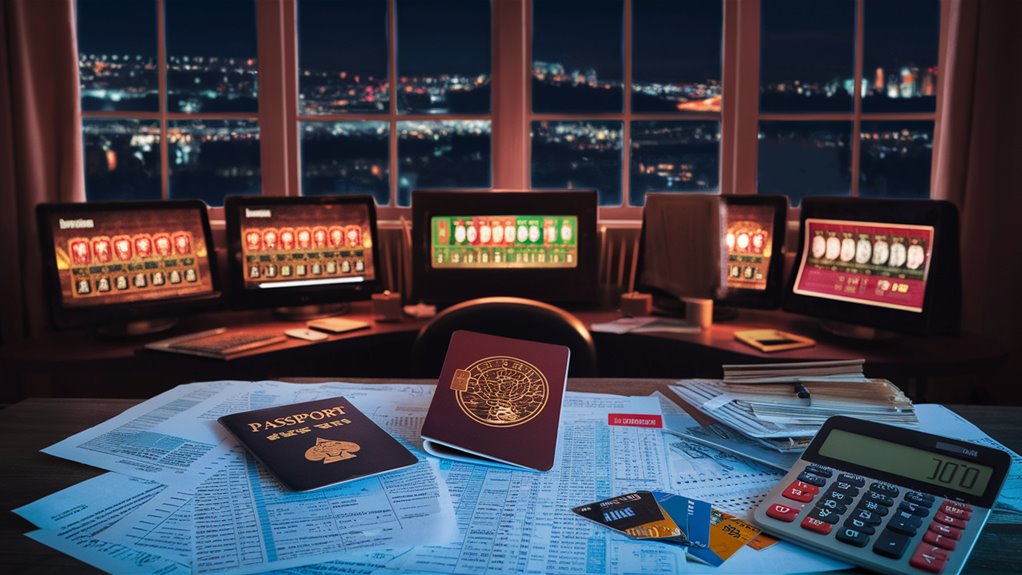Let’s talk about the tricky world of online gambling regulation. You know how the internet has changed pretty much everything? Well, it’s completely transformed the way we need to think about controlling gambling activities across borders. Think of it like trying to catch water with your hands – just when you think you’ve got it contained, it finds new ways to slip through.
Traditional gambling rules were simple enough when casinos were physical buildings you could point to on a map. But nowadays? It’s a whole different ballgame. 먹튀검증 메이저놀이터 Online casinos can pack up their virtual operations and move across continents with just a few clicks. And don’t get me started on how players can dodge local restrictions – between cryptocurrencies and VPNs, it’s like having a digital invisibility cloak.
The real challenge isn’t just keeping up with technology, though. Picture trying to get dozens of countries to agree on traffic rules, except these roads are invisible and constantly changing. That’s kind of what regulators are dealing with. Some nations want strict controls, others are more relaxed, and caught in the middle are players who can bounce between different rules as easily as switching browser tabs.
So what’s the solution? Well, that’s the million-dollar question. We need fresh thinking and new approaches that match the speed and flexibility of the digital age. The old rulebook just doesn’t cut it anymore. Maybe it’s time for countries to work together on this one, because right now, it’s a bit like playing whack-a-mole with a global twist.
Cross-Border Regulatory Enforcement

Let’s talk about one of the trickiest challenges in online gambling regulation – enforcing rules across different countries. You know how the internet makes everything feel borderless? Well, that’s exactly what makes controlling online gambling so complicated.
Think about it this way: imagine trying to catch someone who can instantly move their business from one country to another with just a few clicks. That’s what online casino operators do.
When regulators in one country start cracking down, these virtual casinos simply hop to a more welcoming jurisdiction, making enforcement feel like trying to catch smoke with your hands.
The real headache comes from how different countries view online gambling. Some places welcome it as a legitimate business, while others treat it as completely illegal.
It’s like having a neighborhood where each house follows its own rules about what’s allowed and what isn’t. Add in things like cryptocurrency payments and VPN services, and you’ve got yourself a regulatory puzzle that would make Sherlock Holmes scratch his head.
For regulators, it’s a bit like playing whack-a-mole on a global scale. Just when they manage to shut down an illegal gambling site in one location, another pops up somewhere else.
Gathering evidence? Not so simple when you’re dealing with servers halfway across the world. Getting foreign authorities to help? Well, that’s another story altogether, often involving lengthy diplomatic processes and paperwork that moves at a snail’s pace.
The bottom line is that traditional enforcement methods just aren’t cutting it anymore. We’re trying to apply old-school rules to a digital world that moves at lightning speed.
It’s time to rethink how we handle cross-border gambling regulation, because right now, the house isn’t just winning – it’s running circles around the regulators.
Digital Payment Systems Oversight

Let’s talk about the complex world of digital payment oversight in online gambling. You know how tricky it can be to keep track of your own online transactions? Well, imagine monitoring millions of payments across different platforms while ensuring everything stays legal and secure.
Think of it like being a really strict bouncer at an exclusive club. You need to check IDs (that’s the KYC part), make sure the money’s clean (hello, AML regulations), and keep an eye on everyone’s behavior once they’re inside.
The challenge gets even trickier because payments come in all shapes and sizes, from traditional credit cards to those newer cryptocurrencies everyone’s talking about.
Running an online gambling platform means you’ve got to be super vigilant about where money’s coming from and where it’s going. It’s not just about processing payments, it’s about building a whole security system that can spot anything fishy in real-time.
Picture a high-tech control room where systems constantly scan for unusual patterns or red flags, kind of like a financial 토토사이트 이용시 주의할점 security camera system.
The real kicker? You’ve got to keep tabs on everything while making sure players from restricted areas can’t slip through the cracks. And with cryptocurrencies becoming more popular, there’s a whole new ball game to consider.
These digital currencies can be pretty tricky to track, so operators need special tools to keep everything above board.
Here’s the bottom line: if you’re in the online gambling business
Problem Gambling Prevention Measures

Let’s talk about how online gambling platforms keep players safe and in control. You know how easy it gets to get caught up in the excitement of betting?
Well, that’s why responsible gambling sites now come with some really helpful tools to keep things fun and manageable.
Think of these safety features like having a good friend looking out for you. Want to set some boundaries? You can use self-exclusion programs, put limits on your deposits, or get friendly reminders about how long you’ve been playing.
It’s all about staying in control before emotions take over.
The clever part is how these platforms watch out for warning signs. Just like your bank might flag unusual spending, gambling sites use smart software to spot when someone’s betting patterns start changing.
Maybe you’re playing longer than usual or placing bigger bets – the system notices these things and sends you a gentle heads-up.
Need someone to talk to? These sites have got you covered with instant support through helplines and chat services. They’re required to show clear links to helpful resources, kind of like having a safety net ready whenever you need it.
You’ll also notice built-in breaks between gaming sessions and clear timers showing how long you’ve been playing.
What makes this work so well is how everything fits together. From checking your age when you sign up to regularly reviewing accounts, these measures create a safety system that really looks after players who might be at risk.
It’s like having multiple layers of protection, each doing its part to keep gambling safe and enjoyable.
Cryptocurrency Gambling Compliance

Let’s break down the tricky world of cryptocurrency gambling compliance. You know how traditional gambling regulations can be complex? Well, crypto gambling takes those challenges to a whole new level.
Think about it this way – when players use cryptocurrency to gamble online, they’re operating in a space where traditional identity checks become pretty challenging.
It’s kind of like trying to verify someone’s ID through a frosted glass window. You can see there’s someone there, but the details are fuzzy.
The biggest headache for operators comes from handling KYC and AML requirements. Regular casinos can easily check who’s playing and track where the money goes, but with crypto transactions? That’s a different ball game altogether.
The pseudonymous nature of cryptocurrency makes it tougher to know exactly who’s behind each transaction.
So what’s the solution? If you’re running a crypto gambling platform, you’ll need some pretty sophisticated tools in your arsenal. Blockchain analysis software has become essential, kind of like having a high-tech security system for your digital casino.
These tools help you spot unusual patterns and potentially suspicious activities in real-time.
The key is finding the right balance between maintaining player privacy, which is a big draw of crypto gambling, and meeting those important regulatory requirements.
It’s not impossible, but it definitely requires more creative solutions than traditional gambling operations.
Age and Identity Verification

Let’s talk about age and identity verification in online gambling. You know how important it’s to keep minors away from gambling and prevent fraud, right?
Well, gambling sites have to put some pretty serious checks in place to make sure players are old enough and are actually who they say they are.
Think of it like getting carded at a bar, but way more thorough. You’ll usually need to show your driver’s license or passport, prove where you live, and sometimes even scan your fingerprint or face.
It’s quite a process, and honestly, it can be a bit of a pain.
The tricky part is making these checks thorough without driving players away. Nobody likes waiting around for days while their documents get verified, but that’s often what happens.
Meanwhile, some crafty fraudsters are always cooking up new ways to game the system, using stolen IDs or creating fake documents.
What makes things even more complicated is that different countries have different rules about verification. Some places are super strict about it, requiring tons of paperwork and background checks.
Others? Not so much. It’s kind of like how some restaurants barely glance at your ID while others scan it under a UV light and quiz you about your zodiac sign.
Even with all the fancy technology we’ve now, like automated ID checking systems, nothing’s perfect. These systems can be tricked, and sometimes they make mistakes.
It’s basically an endless back-and-forth between gambling sites trying to keep things secure and fraudsters trying to find new loopholes. Pretty wild when you think about it, right?
Tax Collection Across Jurisdictions

Let’s talk about the tricky business of gambling taxes, especially when it comes to online betting. You know how complicated taxes can be already, right? Well, throw in some international gambling websites, and things get even more interesting.
Think about this for a moment. You’re sitting at home in Canada, playing poker on a website based in Malta. Sounds simple enough, but the tax situation gets pretty messy.
The gambling company pays their corporate taxes in Malta, while you need to figure out how to report those winnings on your Canadian tax return. It’s kind of like ordering food from another country – someone has to pay the bill, but who pays what and where?
The whole thing gets even trickier when we look at how people pay for their online gambling these days. Maybe you’re using Bitcoin, or perhaps you’ve got money in a PayPal account.
Tax authorities often scratch their heads trying to keep up with these modern payment methods. Some countries haven’t quite figured out how to handle cryptocurrency winnings yet, which can leave everyone a bit confused about what to report and where.
To make matters more interesting, different countries have their own ideas about what counts as gambling income. What one country sees as taxable winnings, another might view as hobby-related fun.
And when countries share tax information with each other, well, that adds another layer to the puzzle. It’s like playing a global game of financial hot potato, where everyone needs to figure out who’s responsible for what.
Money Laundering Detection Challenges

Let’s talk about why catching money launderers in online gambling is such a tricky business. You know how it goes – criminals are getting pretty clever at hiding their dirty money in plain sight.
Think about it like finding a specific drop of water in a rushing river. These folks mix their illegal cash into the countless transactions happening every second across gambling sites.
What makes it really challenging? Well, imagine trying to keep track of someone who’s constantly changing disguises. That’s basically what these criminals do – they’ll jump between different accounts, switch up payment methods, and bounce between currencies faster than you can blink.
One minute they’re using a credit card, the next they’re paying with crypto.
The whole online nature of gambling adds another layer of complexity. Picture trying to verify someone’s identity when they could be sitting anywhere in the world, probably using a VPN to mask their location.
It’s like trying to pin down a ghost. Sure, we’ve fancy software to spot suspicious patterns, but these tools sometimes raise false alarms that need human eyes to sort out.
And don’t even get me started on cryptocurrency. While blockchain technology sounds great in theory – giving us a clear record of transactions – it’s super hard to connect digital wallets to real people.
It’s kind of like following footprints that suddenly disappear into thin air. Plus, when these criminals spread their activities across different countries, getting everyone to work together on catching them becomes a real headache.
It’s like trying to coordinate a group project where everyone’s in different time zones and speaking different languages.
Mobile Gaming Security Standards

Let’s talk about mobile gaming security – it’s a bit of a mess right now, isn’t it?
The tricky thing about gambling apps is that security standards are all over the place, depending on where you’re and what device you’re using. Some places take it super seriously, with heavy-duty encryption and double-checking who you are, while others… well, not so much.
You know how it goes – you download one gambling app that needs your fingerprint to even open it, then another that just asks for a basic password. It’s pretty confusing, right?
And don’t get me started on the headaches developers face trying to keep up with different rules for iOS and Android. It’s like trying to follow two different cookbooks for the same dish.
The real challenge comes when you’re trying to figure out if an app is actually secure. Think about it like this: using an unsecured gambling app on public Wi-Fi is kind of like counting your money in a sketchy neighborhood – probably not the best idea.
There are plenty of bad actors out there just waiting to snap up your information.
So, what can you do to stay safe? Well, it’s pretty straightforward. First, check if your app uses SSL encryption (that little padlock symbol is your friend).
Make sure it has secure payment options, and keeps its security up to date. It’s also worth looking into whether the app has gotten thumbs up from gaming authorities and security experts.
Since there’s no one-size-fits-all security standard yet, you’ve got to be your own security guard when it comes to protecting your financial info.
Common Questions
How Do Cultural Differences Impact the Acceptance of Online Gambling Regulations Worldwide?
You know, it’s fascinating how different cultures around the world look at online gambling. Let’s break this down a bit. In some places, like many European countries, betting online is just another form of entertainment, as normal as going to the movies. But hop over to countries with strong religious influences, and you’ll find a completely different story.
Think about it – what’s totally fine in Las Vegas might raise eyebrows in Dubai. These cultural differences aren’t just about personal choices either. They actually shape how governments create and enforce gambling laws. In some Asian countries, for instance, traditional family values and social harmony play a huge role in restricting gambling activities.
The interesting part is how these cultural attitudes keep evolving. Take the United States, where views on online gambling have shifted dramatically over the years. Some states now fully embrace it, while others still maintain strict restrictions. It’s kind of like how different families have their own house rules, but on a much bigger scale.
And get this – even within the same country, you’ll often find varying levels of acceptance. Some communities might see online betting as a threat to their traditional values, while others view it as a potential economic boost. These local perspectives end up influencing everything from tax policies to advertising regulations.
Culture really does run deep when it comes to gambling policies. It’s not just about making laws – it’s about respecting deeply held beliefs and social values that have been around for generations.
Can Artificial Intelligence Effectively Predict and Prevent Gambling Addiction Patterns?
You know how technology keeps getting smarter? Well, AI is now stepping up to help tackle gambling addiction in some pretty interesting ways. Think of it as having a watchful friend who notices when your betting habits start changing. The AI systems can quietly keep track of how often you place bets, how much time you spend on gambling sites, and whether your spending is creeping up over time.
But here’s the really clever part – these systems don’t just collect data. They actually learn to spot warning signs that might indicate someone’s heading toward problematic gambling. When the AI notices concerning patterns, like sudden increases in betting amounts or late-night gambling sessions, it can send out gentle nudges or helpful reminders.
It’s kind of like having a smart health app that notices when you’ve been sitting too long and suggests taking a walk. The AI might send you a friendly message saying, “Hey, we’ve noticed you’ve been playing longer than usual lately. Want to take a break?” Or it could share some helpful resources if it spots potentially risky behavior.
The best part is that these systems work 24/7, catching subtle changes in behavior that humans might miss. And since they’re automated, there’s no awkward conversation or judgment involved – just helpful, timely support when someone might need it most.
What Role Do Internet Service Providers Play in Blocking Illegal Gambling Sites?
Let’s break down the important role Internet Service Providers play in keeping illegal gambling sites at bay. You know how ISPs act as our gateway to the internet? Well, they actually have several tools at their disposal to help block access to unlawful gambling platforms.
First up, ISPs can filter IP addresses, which is kind of like putting up a digital roadblock. When you try to visit a banned gambling site, your ISP checks the destination against a list of blocked addresses and simply stops the connection if there’s a match.
They also use something called DNS blocking, which is pretty clever. Think of it as the internet’s phone book – when you type in a website address, your ISP can redirect you away from illegal gambling sites by essentially making that address disappear from their directory.
But here’s the interesting part: ISPs don’t work alone in this effort. They team up with law enforcement and regulatory bodies to stay updated on which sites need blocking. It’s like having a neighborhood watch program, but for the internet. They receive official lists of illegal operators and quickly add them to their blocking systems.
Of course, some tech-savvy users might try to find workarounds, but ISPs are constantly updating their methods to stay one step ahead. They’ve become quite good at adapting their blocking techniques as new illegal gambling sites pop up.
How Do Gambling Regulations Affect Esports Betting and Virtual Sports Markets?
Let’s talk about the fascinating world of esports and virtual sports betting regulations. You know how traditional sports betting has pretty clear rules, right? Well, when it comes to esports and virtual sports, things get a bit trickier.
Picture this: you’re trying to place a bet on your favorite League of Legends team, but the rules in your country aren’t exactly crystal clear. That’s the reality many bettors face today. Different countries have different approaches, and honestly, many are still trying to figure out how to handle these new betting markets.
Some jurisdictions treat esports betting just like traditional sports wagering, while others haven’t quite made up their minds yet. It’s kind of like being in that awkward phase where everyone knows something needs to be done, but no one’s quite sure what that something should be.
The real challenge comes down to licensing and player protection. Think about it: when you’re betting on virtual sports or esports matches, you want to know your money is safe and the games are fair, right? But without clear regulations, it can feel a bit like the Wild West out there.
Do Weather Patterns or Seasonal Changes Influence Online Gambling Participation Rates?
Let’s talk about how weather affects our online gambling habits. You know how we tend to spend more time indoors when it’s cold and rainy outside? Well, research shows this actually influences how much time people spend on online gambling platforms.
During those chilly winter months, when we’re all bundled up inside seeking entertainment, online gambling numbers typically spike. Think about those long, dark evenings when you’re scrolling through your phone or laptop, looking for something to do. It makes sense, right?
Summer tells a different story. When the sun’s shining and people are out enjoying beach days, barbecues, and outdoor activities, online gambling platforms usually see fewer active users. After all, who wants to sit inside betting when there’s perfect weather for a game of tennis or a picnic in the park?
Interestingly, even rainy days throughout the year can cause small upticks in online gambling activity. It’s pretty simple when you think about it – bad weather keeps us indoors, and indoor time often means more screen time, whether we’re streaming movies, playing games, or yes, trying our luck at online gambling.